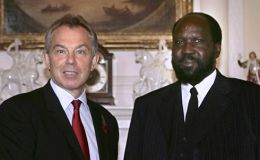Sudan to face isolation, if Darfur crisis not swiftly ended – Blair
Nov 6, 2006 (LONDON) — Prime Minister Tony Blair said Monday that if Sudan’s government does not make progress in the next few weeks in stopping violence in Darfur and promoting peace talks, Britain, the European Union and the United States will have to find other ways to end the crisis.
 Speaking at his monthly news conference, Blair said this is the message that he gave Salva Kiir Mayardit, Sudan’s first vice president, during his visit to London on Oct. 31, and asked him to take it back to Sudan’s leader.
Speaking at his monthly news conference, Blair said this is the message that he gave Salva Kiir Mayardit, Sudan’s first vice president, during his visit to London on Oct. 31, and asked him to take it back to Sudan’s leader.
Blair told Kiir, a former leader of Sudan’s southern rebels, that Sudan’s government has one last chance to move toward ending the conflict, or it will face international isolation. Kiir has publicly disagreed with Sudanese President Omar al Bashir over Bashir’s refusal to accept U.N. peacekeepers, one of the conditions the British government has said Sudan must accept.
Blair has urged fellow European leaders to exert “maximum pressure” on Khartoum to ease fighting in the violence-wracked region, where a three-year-old war has left some 200,000 people dead and 2.5 million displaced. Sudan’s government is accused of unleashing brutal militiamen known as janjaweed in the remote western region.
The U.N. has authorized 20,000 troops to replace an under-equipped force of 7,000 African Union peacekeepers in Darfur. But the Sudanese government has rejected the U.N. force and expelled the U.N.’s Sudan envoy, Jan Pronk.
Asked about his meeting with Kiir, Blair said Monday that he told him: “There is no desire whatever to have the U.N. force take over Sudan, change the government, or bring members of the government before the International Criminal Court. … It is a simple desire to stop the displacement of people and the death of people in Darfur, and in order to do that — since the government of Sudan has been unable to do it — we need an external force.”
Blair said such a force could stop the violence so Sudan’s government could try to bring all the parties involved into a negotiated settlement.
“There are other things in the news at the moment, but this is not off our agenda all, not here, not in the U.S., not in Europe,” Blair said. “This is an important issue, and in the next few weeks we will have to have some form of progress, or we will be looking for other ways to resolve this.”
In Washington, Michael J. Gerson, a former adviser and speechwriter for President Bush, said “a push for a compromise” was the best approach to the stalemate over sending U.N. peacekeepers to Sudan.
Gerson, now a senior fellow with the private Council on Foreign Relations, said the current African force might be augmented with contributions from additional African and also Arab countries.
And, Gerson told reporters, “Under the right circumstances you have to consider a blockade” of Sudan.
However, to influence President Omar al-Bashir “there has to be a genuine upside” for his regime, such as by sending a U.S. ambassador to Khartoum, he said.
While Gerson credited Bush with taking the lead in trying to counter genocide in Sudan, he said the situations in Iraq and Iran were “sucking oxygen out of other foreign policy issues.”
Blair recently discussed Darfur with U.S. President George W. Bush, U.N. Secretary-General Kofi Annan and German Chancellor Angela Merkel in London.
(AP)
